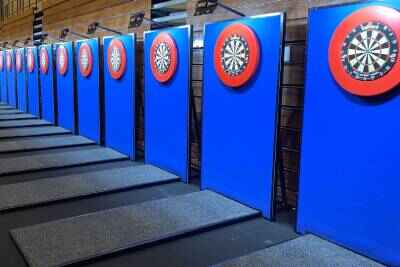
Welcome to the PDC Qualifying School (Q-School), where rising dart talents compete for the highly sought-after PDC Tour Card. Held annually in January, Q-School is the entry point into the world of professional darts, featuring two key events—UK Q-School and European Q-School. It’s here that players begin their journey, vying for a place among the sport’s elite and the chance to elevate their careers to the next level.

What is the PDC Qualifying School?
The PDC Qualifying School, affectionately known as Q-School, is your golden ticket to the professional darts circuit. Every January, players from around the globe converge at two primary venues: Milton Keynes in England for the UK Q-School and Kalkar in Germany for the European Q-School.
Over four intense days, players compete to secure one of the highly sought-after PDC Tour Cards. These cards are essential for entry into professional tournaments and are awarded based on performance across various stages.
Eligibility and Registration: Who Can Join?
If you’re itching to join the darting elite, you’ll need to meet a few criteria. First off, you must be at least 16 years old by the start of Q-School. No upper age limits here—whether you’re a young prodigy or a seasoned player, you’re welcome.
Registration is open to players worldwide, with the choice to compete in either the UK or European Q-School depending on your location or preference. The entry fee is £450 (about $600), which covers your shot at a Tour Card. Should you snag one of those precious cards, an additional £100 fee is required.
Venues & Participation: Where the Action Happens
Q-School takes place at two bustling locations: Milton Keynes in England and Kalkar in Germany. Each venue becomes a high-energy battleground where over 850 players vie for their spot. The UK Q-School caters to players from Great Britain, Northern Ireland, and Ireland, while the European Q-School is the playground for players from the rest of Europe. This division ensures that players are competing against peers from similar regions, although the level of competition can vary between the two.

The Structure of PDC Q-School: Stages and Stakes
The journey through Q-School is divided into two main stages: the First Stage and the Final Stage. The First Stage is a grueling qualifier where all registered players compete for a chance to move on to the Final Stage. This initial stage is fiercely competitive, with hundreds of players scrambling for a limited number of spots.
In the Final Stage, the stakes are even higher. For four days, 128 players at each venue face off in knockout-style matches. Each day, one player emerges victorious and earns a Tour Card, ensuring their place in the professional darts circuit. Additional Tour Cards are awarded based on the Order of Merit, a ranking system that reflects players’ performances throughout the event.
The Role of the PDC Order of Merit
The PDC Order of Merit is a crucial player in Q-School. This ranking system is based on prize money earned over the past two years, creating a leaderboard that determines player seedings and qualifications for various PDC events. The top 64 players on this list automatically retain their Tour Cards, while others can earn a spot based on their performance in the Challenge and Development Tours.
The Order of Merit is calculated using a rolling 104-week period, ensuring that players’ recent performances are reflected in their rankings. As older results drop off, maintaining a high ranking requires consistent success.
Exemptions & Automatic Entries: Who Gets a Pass?
Not every player has to slog through the First Stage. Some get a free pass directly to the Final Stage based on specific criteria. Players who lost their Tour Cards the previous year receive exemptions, as do the top eight players from each region’s Challenge and Development Tours.
In the UK Q-School, 32 players typically receive these exemptions, while in the European Q-School, 19 players benefit from them. These exemptions are a testament to their past performances and help ensure that the Final Stage remains competitive and filled with seasoned talent.
Life After Q-School: What Does a Tour Card Provide?
A PDC Tour Card brings a qualifying player several significant benefits and opportunities, solidifying their place in the professional darts world. Here’s what it entails:
- Access to PDC ProTour Events
A Tour Card grants entry to all PDC ProTour events, including the Players Championship tournaments, European Tour qualifiers, and UK Open qualifiers. These events provide regular opportunities to compete for substantial prize money and ranking points. - Eligibility for Major Tournaments
Holding a Tour Card makes you eligible to qualify for major televised PDC events, such as the World Championship, World Matchplay, and the Grand Slam of Darts. Success in ProTour events can secure your spot in these prestigious tournaments. - Ranking Opportunities
Tour Card holders can accumulate ranking points in the PDC Order of Merit, which is crucial for seeding in tournaments and maintaining your professional status. Your performance in these events determines your ranking among the world’s top players. - Guaranteed Competitions
With a Tour Card, you’re guaranteed participation in a minimum number of tournaments each year, providing a stable platform to develop your game and gain experience against the best in the world.
- Increased Earnings Potential
The PDC circuit offers lucrative prize money across its events. A Tour Card opens the door to these financial rewards, helping to support your career and offset expenses related to travel, accommodation, and training. - Sponsorship and Endorsement Opportunities
As a professional player with a Tour Card, you are more attractive to sponsors. A strong performance on the circuit can lead to lucrative endorsement deals, providing additional income and resources to support your career. - Professional Recognition
Securing a PDC Tour Card places you among an elite group of professional darts players. It’s a symbol of your skill and dedication, earning you recognition and respect within the darts community. - Networking and Exposure
Being part of the PDC Tour gives you valuable exposure to fans, media, and other professionals in the sport. Networking opportunities can lead to further career advancements, such as exhibition matches, appearances, and coaching roles. - Development and Growth
Competing regularly against top-tier players pushes you to continually improve your game. The experience gained from high-level competition is invaluable for your development as a professional player. - Two-Year Security
A PDC Tour Card is valid for two years, providing some security and stability in your professional darts career. This allows you to plan and focus on long-term goals without the immediate pressure of requalification.
Life After Q-School: What If You Don’t Get a Tour Card?
If you don’t score a Tour Card, all hope isn’t lost. Players who fall short still become PDPA Associate Members, granting them access to various PDC events. They can compete in the Challenge Tour, which features 24 tournaments with a top prize of £2,500, or the Development Tour, designed for players under 24 looking to hone their skills.
These tours have their own Orders of Merit, and top performers may still secure a Tour Card for the next season based on their success.
Notable Players & Success Stories
Q-School has been the launchpad for several darting careers. Dirk van Duijvenbode, for instance, won the Q-School in 2020 and has since become a familiar face on the PDC Tour. Fallon Sherrock, renowned for her historic PDC World Championship run, has also made her mark at Q-School. Former World Youth Champion Max Hopp and ex-World Champion John Part are other notable participants who have used Q-School as a steppingstone to their professional careers.
The Future of PDC Q-School: A Growing Legacy
As the PDC continues to expand, Q-School remains a vital component in nurturing new talent. Each year, the competition intensifies, attracting a diverse group of players from across the globe. The event’s structure and opportunities ensure that Q-School will keep being a key pathway for those aspiring to reach the pinnacle of professional darts.
In summary, the PDC Qualifying School is not just an event; it’s the gateway to the world of professional darts. Whether you’re a seasoned pro looking to reclaim your spot or a newcomer dreaming of a darting career, Q-School offers a challenging yet rewarding pathway to achieving your goals.
Frequently Asked Questions (FAQ’s)
What is PDC Q-School?
Answer: PDC Q-School is a qualifying tournament organized by the Professional Darts Corporation (PDC) where players compete for the chance to earn a PDC Tour Card. A Tour Card grants access to all PDC ProTour events for two years, allowing players to compete at the highest level in professional darts.
Who can participate in PDC Q-School?
Answer: PDC Q-School is open to any darts player aged 16 or older who does not already hold a PDC Tour Card. There are no specific qualifications required, making it accessible to both amateur and professional players looking to secure a spot on the PDC circuit.
How is PDC Q-School structured?
Answer: PDC Q-School typically runs over several days and is divided into two main sections: the UK Q-School and the European Q-School. Players compete in a series of knockout matches, with the top performers earning a Tour Card based on their results or accumulated points over the event.
How many Tour Cards are available at Q-School?
Answer: The number of Tour Cards available at Q-School varies each year, but generally, around 30 Tour Cards are awarded across both the UK and European Q-School. Cards are given to the event winners and the highest-ranking players on the Q-School Order of Merit.
What are the costs associated with entering Q-School?
Answer: Entering PDC Q-School typically requires a registration fee, which has been around £450 in recent years. Participants must also cover their own travel, accommodation, and other expenses related to the event.
What happens if I don’t get a Tour Card at Q-School?
Answer: If you don’t earn a Tour Card, you can still compete in the PDC Challenge Tour and, if eligible, the Development Tour. These circuits provide opportunities to gain experience, earn prize money, and potentially qualify for ProTour events or the following year’s Q-School.
Can I enter Q-School more than once?
Answer: Yes, players can enter Q-School as many times as they wish, provided they meet the eligibility requirements each year. Many players return to Q-School after missing out in previous attempts, with some eventually earning a Tour Card after multiple tries.
How can I prepare for PDC Q-School?
Answer: Preparation for Q-School involves regular practice, mental conditioning, and participation in competitive events to sharpen your skills. Analyzing your game, working on weaknesses, and seeking advice from experienced players can also enhance your chances of success.
What is the Q-School Order of Merit?
Answer: The Q-School Order of Merit is a ranking system used during the event to determine which players, besides the daily winners, earn a Tour Card. Points are awarded based on match wins and performance throughout the event, with the highest-ranking players on the Order of Merit receiving Tour Cards.
What opportunities does a PDC Tour Card provide?
Answer: A PDC Tour Card grants access to all PDC ProTour events, including Players Championship tournaments and European Tour qualifiers. It also makes players eligible for major PDC televised events, such as the World Championship, and provides opportunities to earn significant prize money and ranking points.




